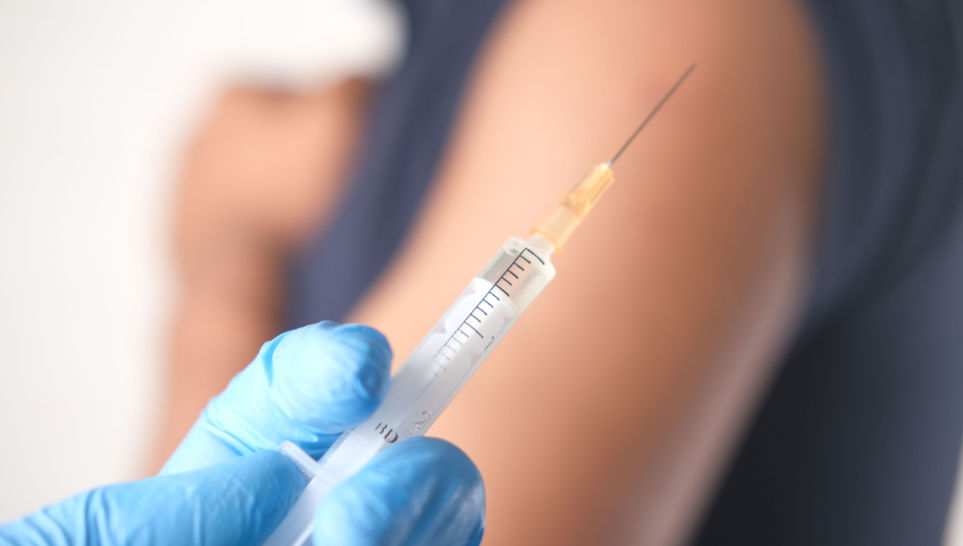The hepatitis B vaccine protects against hepatitis B, a contagious liver disease caused by infection with the hepatitis B virus. Hepatitis B is a common disease in the United States and can cause minor illness lasting a couple of weeks or result in a more severe, lifelong illness.
Acute Hepatitis B
Acute Hepatitis B is a short-term illness that can lead to:
- Jaundice
- Nausea
- Vomiting
- Loss of appetite
- Fatigue
- Fever
- Pain in the joints, muscles, and stomach
Acute hepatitis B usually doesn’t require treatment. Most people will overcome the infection on their own, requiring only rest and hydration.
Chronic Hepatitis B
Chronic hepatitis B is a long-term illness that occurs when the hepatitis B virus remains in the person’s body. Most people who develop chronic hepatitis B virus don’t have symptoms, but it’s still serious and can lead to liver damage, liver cancer, and sometimes death.
People who are chronically infected with hepatitis B can spread the virus to others even if they don’t look or feel sick themselves. Chronic hepatitis B is treated using antiviral medications, which help fight the virus and may reduce the risk of future liver complications. If hepatitis B severely damages the liver, you may need a liver transplant.
Hepatitis B spreads when body fluid infected with the virus, such as semen or blood, enters the body of someone who is not infected. People can be infected through:
- Sharing items, such as toothbrushes or razors, with an infected person
- Contact with the open sores or blood of an infected person
- Exposure to blood from sharp instruments such as needles
- Sex with an infected partner
- Birth (if a mother has hepatitis B, her baby can become infected)
Most people who get vaccinated with the hepatitis B vaccine get a lifelong immunity to the disease.
Hepatitis B Vaccine Recommendations
The hepatitis B vaccine is recommended for all infants and children up to 18 years of age. The CDC also recommends that adults in high-risk groups be vaccinated. These include:
- People with hepatitis B-infected sexual partners
- Victims of sexual abuse or assault
- Health care or public safety workers at risk of exposure to bodily fluids or blood
- Staff or residents of facilities for developmentally disabled persons
- People who travel to regions with increased rates of hepatitis B
- Persons in correctional facilities
- People who share drug injection equipment, such as needles and syringes
- People seeking evaluation or treatment for a sexually transmitted disease
- People who have contact with an individual infected with the hepatitis B virus
- Persons with HIV infection
- Men who have sexual contact with other men
Who Should Not Get the Hepatitis B Vaccine?
Generally considered to be safe, there are circumstances in which doctors advise against the HBV vaccine. You shouldn’t receive the vaccine if:
- You’re experiencing a moderate or severe acute illness
- You have a history of hypersensitivity to other vaccine components
- You’ve had a severe allergic reaction to a previous dose of hepatitis B vaccine
People who are feeling ill should postpone receiving the vaccine until their condition improves.
Side Effects of the Hepatitis B Vaccine
Although most people don’t experience any adverse effects, the hepatitis B vaccine can cause some side effects. The most common symptom is a sore arm or swelling from the site of injection. Mild side effects usually last only a day or two and typically include:
- Redness, itching, or swelling at the injection site
- Nausea
- Fever
- Sore throat
- Stuffy or runny nose
- Irritability, especially in children
- Fatigue
- Headache
- Dizziness
- A purple lump or spot at the injection site
Hepatitis B vaccine side effects vary from one person to the next. If you have symptoms of an allergic reaction, contact your doctor right away. Some side effects you experience may require medical attention, so talk to your physician to discuss any unusual physical changes after vaccination.
Hepatitis B Vaccine Injuries
All vaccines containing the Hepatitis B virus are covered under the Vaccine Injury Compensation Program (VICP). Since 1986, the program has offered vaccine injury victims a way to get compensation without suing pharmaceutical manufacturers or doctors.
Vaccine lawsuits are filed in the U.S. Court of Federal Claims, rather than regular federal or state courts like other drug injury claims. It also helps to note that the VICP is a no-fault compensation program.
When filing a petition with the VICP, it’s much easier to receive compensation for injuries listed in the Vaccine Injury Table. The following adverse reactions are covered:
- Shoulder Injury Related to Vaccine Administration (SIRVA).
- Anaphylaxis
- Vasovagal Syncope
There are various types of SIRVA, many of which can lead to long-lasting effects. Individuals who experience rotator cuff injuries, bursitis, frozen shoulder, or shoulder pain after vaccination against hepatitis B should consult their doctor about their vaccination to ensure they get a proper diagnosis.
What If the Injury Isn’t Listed in the Table?
After a hepatitis B vaccine, some people may experience an injury that isn’t listed in the table. There’s a chance that the VICP can compensate them if their injury meets the following criteria:
- It has resulted in death
- It has resulted in “inpatient hospitalization and surgical intervention”
- It has lasted more than six months after vaccination
Hepatitis B Infection and Immune Globulin
If you think you’ve been exposed to hepatitis B within the last two weeks, talk to your doctor immediately. People who have not been vaccinated may be able to prevent infection by receiving an injection of HBV immune globulin and the hepatitis B vaccine.
Contact Us Today
It doesn’t cost you to hire an attorney to represent you in a vaccine injury claim. Attorney fees are paid through the VICP program, whether the petition results in a payment or not.
If you believe your injury is vaccine-related, speak to our experienced team at Sadaka Associates today. We are an experienced vaccine injury law firm and can help you navigate the legal processes for compensation. It’s crucial that you act fast, as there’s a three-year window to file a petition with the VICP.
MYASTHENIA GRAVIS AFTER HEPATITIS B VACCINE
$40,000 total settlement for a young woman from California who developed myasthenia gravis, along with fatigue, muscle weakness, eyelid drooping, and fatigue-induced diplopia as a result of receiving a Hepatitis B vaccine.
EYELID DROOPING AFTER HEP B VACCINE
$40,000 settlement for adult female who suffered from myasthenia gravis (muscle weakness and eyelid drooping) after receiving the hepatitis B vaccine.
BRACHIAL NEURITIS AFTER MULTIPLE VACCINES
$250,000 settlement for adult male who suffered from brachial neuritis after receiving influenza, Tdap, meningococcal, hepatitis A, hepatitis B, IPV, and MMR vaccines.
BRACHIAL NEURITIS AFTER MULTIPLE VACCINES
$250,000.00 settlement for a 19 year old man enlisted in the army, who developed brachial neuritis as a result of receiving the influenza vaccine, tetanus diphtheria accellular pertussis or Tdap vaccine, meningococcal vaccine, hepatitis A and B vaccines, polio inactivated or IPV vaccine, and measles mumps and rubella or MMR vaccine.
BRACHIAL NEURITIS AFTER HEPATITIS B VACCINE
$60,000.00 settlement for a 31 year old male from North Carolina who developed brachial neuritis and shoulder pain as a result of receiving the hepatitis B vaccination.
MULTIPLE INJURIES AFTER MULTIPLE VACCINES
$35,000.00 settlement for a 31 year old woman from Pennsylvania who developed vaccine-induced anaphylactic reaction, weakness, Parsonage Turner Syndrome, peripheral neuropathy, and transverse myelitis as a result of receiving an influenza, hepatitis A, hepatitis B, polio, and Diphtheria-Tetanus-acellular Pertussis or DTaP vaccinations.






